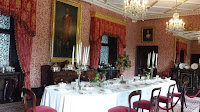 |
| Ireland! |
 |
| Cahir Castle |
How to begin writing about a fabulous vacation in Ireland?
We stayed in five locations over two weeks and saw such wonderful sites along the way, but there's still much that was missed so we'll have to go back again!
Our first stop was fabulous
Cahir Castle (pronounced Care). At Cahir, we purchased the family Irish Heritage Card for 60 Euro. What a deal! We stopped at a number of heritage sites and calculated that if we’d paid separate admission at each it would have been 127 Euro (at least).
 |
| View of Cahir town from the castle |
Cahir Castle was amazing, and a great introduction to the wonder yet to come. We did a self-tour, wandering from room to room, reading signs and our pamphlet to learn about each site. The Great Hall had a special display of memorabilia from the 1916 Easter Rising and War of Independence. The core of the castle dates to the 13th century, and overall the structure was very well preserved. We were entranced. Outside the castle was a farmer’s market, and we had snacked on lemon cake, hot chocolate, and other fresh goodies.
 |
| View of Rock of Cashel from Hore Abbey |
 |
| Cashel's round tower |
Next we headed to nearby
Rock of Cashel, which is often on the must-see lists for Ireland. Finding a parking spot near the Rock of Cashel was challenging; we wound up walking a bit through the town, which was fine. Legend says the Rock of Cashel originated in the Devil’s Bit (a nearby mountain) when St. Patrick banished Satan from a cave, resulting in the Rock's landing in Cashel. Cashel is said to be the site of the conversion of the King of Munster by St. Patrick in the 5th century and was the seat of the kings of Munster for several hundred years. The round tower is dated to ~1100, while the cathedral was built in the mid-1200s. We walked a bit further to the 13th century ruins at
Hore Abbey. Exploring the Cashel site was very different that our trip to Cahir Castle because the former is ruins and the latter is restored. Both have their merits and I’d recommend each!
We drove on to our lodging,
Moate Lodge (built in 1740) in Athy.
 |
Moate Lodge, our lovely base in Athy, Kildare
|
We were warmly greeted with scones and tea, and our room with large and comfortable. We went into Athy for dinner, then had an early night – but we made it through the very long first day without naps. This surely helped us minimize the effects of jet lag on our trip.
The next morning, after an enormous (and delicious!) full Irish breakfast, we drove to Kilkenny to meet with our friend Christina who was taking the bus there from Dublin. We set out to explore the Medieval Mile, starting with
Kilkenny Castle. This structure was built in the early 13th century. Most is fully restored to 1800's opulence, but there are some medieval rooms. There are amazing tapestries and a seemingly endless portrait hall that felt like an art museum.



We walked through
Kilkenny's Medieval Mile and had a delicious lunch at
Kyteler’s Inn, established 1324. The original owner was Dame Alice le Kyteler, born in 1263. She had four husbands and quite a fortune, leading for her enemies to accuse her of witchcraft. She escaped being burned at the stake (though her servant did not) by fleeing to England.
St. Canice’s Cathedral has one of only two round towers in Ireland that can be climbed to the top. Our boys went up the 9th century tower, while we opted to explore the inside of this magnificent 13th-century church.
Kells Priory was nearby, so we took the short drive to explore these ruins, founded in 1193. There was no fee to enter but members of the OPW (office of public works) were about to give the last tour of one of the medieval tower houses. So glad we did that! This place felt more like a fortress than a monastery, but the frequent attacks made the fortifications a necessity. Nearby was the
Kilree Round Tower and 9th century High Cross, so we viewed these before dropping off Christina at the Kilkenny bus station and heading back for dinner in Athy.
 |
| Photo bomb at Kells Priory |


The next day we were headed to Northern Ireland, but there was too much to see in Kildare first. First, we went to magnificently carved
Moone High Cross, then found the Scandanavian hogback stone (only Viking grave in Ireland) and high crosses of
Castledermot. We just had to go find the magnificent 5000-year-old
Brownshill Dolmen, a megalithic portal tomb! My boys loved exploring the fabulous ruins of
Duckett's Grove, though it was relatively new at "only" 300 years old. We bypassed Dublin and Belfast, then checked into Morning Calm B&B in Ballymoney (see part 2 of this 5 part blog) for three nights in
Northern Ireland.






















Thank you for your blog post. I've found it to be quite informative and helpful to my planning my trip to Ireland. Much appreciated.
ReplyDeleteThanks Tootsie! I'm glad you found the post useful. Hope you have wonderful trip to Ireland -- indeed, it would be hard not to!
ReplyDelete